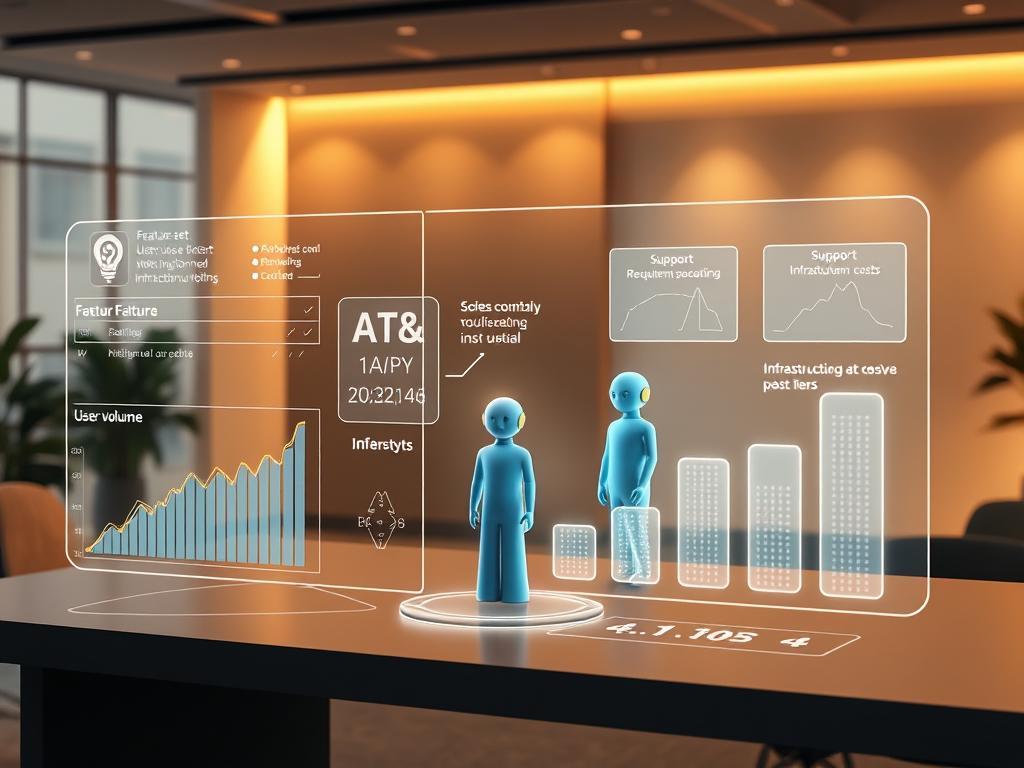Businesses are embracing AI virtual assistants to boost efficiency and cut costs. Human virtual assistants typically charge £12 to £40 per hour. AI solutions are changing how companies handle their workload.
AI virtual assistant costs are reshaping business expenses. Subscription services range from £16 to £400 monthly. These offer unmatched flexibility and cost-effectiveness.
Unlike human assistants, AI alternatives provide 24/7 support without overtime charges. Businesses can now access advanced tech support at a fraction of traditional staffing costs.
The initial setup for an AI virtual assistant may cost £80 to £800. Ongoing monthly fees are much lower than hiring full-time human staff.
Grasping these pricing details is vital for businesses aiming to boost efficiency. AI virtual assistants offer a game-changing solution. They blend cutting-edge tech with significant cost savings.
Understanding AI Virtual Assistants and Their Value Proposition
AI virtual assistants are revolutionising business task management and customer interactions. These intelligent digital helpers boost workplace productivity with unmatched efficiency. They offer unprecedented capabilities, transforming how companies operate.
Modern AI assistants go beyond simple administrative tasks. They represent a massive leap in digital support. These assistants combine advanced technology with intelligent task management.
Types of Virtual Assistant Tasks
AI virtual assistants excel in handling diverse professional tasks:
- Email management and filtering
- Schedule coordination and calendar management
- Data entry and information processing
- Customer support and engagement
- Multilingual communication support
Benefits of AI Assistants vs Human VAs
“In five years, everyone will have an AI-powered assistant” – Bill Gates
The AI vs human VAs comparison reveals remarkable advantages:
- 24/7 Availability: Continuous operational support
- Rapid data processing and analysis
- Scalable task management
- Consistent performance without fatigue
Key Features and Capabilities
AI virtual assistants use advanced tech for exceptional performance. They manage complex tasks and analyse customer preferences simultaneously. These assistants provide personalised recommendations across various business domains.
Gartner reports that automating call centres can boost customer satisfaction by 30%. It can also cut operational costs by 25%. This shows the transformative potential of AI assistants.
Current Market Rates for AI Virtual Assistant Services
The AI assistant market offers varied options for businesses of all sizes. Virtual assistant costs are competitive, ranging from basic packages to enterprise-level solutions. Prices have become more affordable, making these services accessible to many companies.
AI virtual assistant rates show remarkable flexibility. Basic services start at £15 per month. Mid-tier options typically cost between £75-£225 monthly. Advanced enterprise-level assistants can reach up to £375 per month.
- Basic AI assistant services start as low as $20 per month
- Mid-tier solutions typically range between $100-$300 monthly
- Advanced enterprise-level AI assistants can cost up to $500 per month
Different pricing models suit various business needs. Some platforms offer tiered approaches for scalability and cost-effectiveness. Time etc. presents a structured pricing strategy:
- 10-Hour Plan: $380/month ($38/hour)
- 20-Hour Plan: $740/month ($37/hour)
- 40-Hour Plan: $1440/month ($36/hour)
- 60-Hour Plan: $2100/month ($35/hour)
Virtual assistant services often cut operational costs by 30% to 70%. This makes them attractive for companies seeking efficient and economical support. Compared to traditional hiring, businesses can enjoy substantial savings.
AI virtual assistants represent not just a cost-cutting measure, but a strategic investment in technological efficiency.
When choosing an AI assistant, consider your specific needs. Balance feature complexity with budget constraints. The market evolves rapidly, offering sophisticated solutions at competitive rates.
How Much for an AI Virtual Assistant for Business
Business AI assistant costs vary widely. Companies can choose from affordable subscriptions to comprehensive enterprise solutions. Each option caters to different business needs and budgets.
AI virtual assistants come with diverse pricing structures. These models are designed to suit various business requirements. Let’s explore the different options available.
Subscription-Based Pricing Models
AI virtual assistants often use subscription pricing. This model offers flexibility for businesses of all sizes. Here’s a look at typical pricing tiers:
- Lite Plan: Free, providing basic chatbot features
- Plus Plan: Starting at £140 per month, supporting up to 1,000 monthly active users
- Enterprise Plan: Custom pricing with advanced features for larger organisations
One-Time Setup Costs
Setting up an AI virtual assistant usually involves initial expenses. One-time setup fees can range from £100 to £1,000. The cost depends on the level of customisation needed.
| Setup Level | Cost Range | Features |
|---|---|---|
| Basic | £100 – £300 | Standard configuration |
| Advanced | £500 – £1,000 | Custom integrations |
Enterprise-Level Solutions
Larger businesses often need more complex AI solutions. These enterprise-level options offer advanced features and capabilities. Customised implementations can include:
- Unlimited user access
- Advanced analytics
- Dedicated support
- Multi-language capabilities
Enterprise solutions require direct consultation for accurate pricing. This ensures the AI assistant meets all organisational needs. Costs are tailored to each business’s specific requirements.
Factors Influencing AI Virtual Assistant Prici
AI virtual assistant costs involve a complex set of variables. Businesses must weigh multiple factors that affect overall expenses when exploring AI solutions.
Key AI pricing factors include:
- Complexity of required tasks
- Level of customisation needed
- Integration capabilities with existing systems
- Scale of deployment
AI investments are set to boom. Experts forecast spending to exceed £300 billion in the near future. This growth highlights the need to grasp pricing dynamics.
“The right AI solution isn’t about the lowest cost, but the most strategic investment for your business needs.”
Custom AI solutions can cost between £6,000 and £300,000, based on specific needs. Third-party AI software typically ranges from £0 to £40,000 yearly.
Development complexity, required features, and ongoing support greatly impact these costs. Businesses should consider expenses across various areas.
- Initial development costs
- Ongoing maintenance
- Potential hardware investments
- Training and implementation
Choosing the right AI assistant requires balancing technical prowess with budget limits. Understanding these pricing nuances helps organisations make smart, strategic decisions.
Cost Comparison: AI vs Traditional Virtual Assistants
Businesses face a crucial choice between AI-powered and traditional virtual assistants. The virtual assistant landscape has changed dramatically. It now offers compelling alternatives to conventional staffing models.
AI and human assistant costs reveal fascinating insights into workplace efficiency. Traditional virtual assistants charge £15 to £50 per hour. AI assistants offer non-stop support at a fixed monthly rate.
Hourly Rate Analysis
AI solutions show significant cost advantages in virtual assistant ROI. They can handle multiple tasks at once. AI assistants also have lower labour costs than humans.
- AI assistants can handle multiple tasks simultaneously
- Reduced labour costs compared to human counterparts
- Consistent performance without fatigue or salary increments
Long-Term Cost Benefits
AI benefits go beyond immediate financial savings. AI virtual assistants offer scalable solutions that grow with your business. They eliminate recruitment, training, and ongoing personnel management costs.
Return on Investment Considerations
Businesses can boost efficiency by integrating AI assistants strategically. The key is understanding each task’s complexity. Then, select the best solution—AI-driven or human-managed.
AI assistants are not replacements but powerful augmentation tools for human productivity.
Conclusion
AI virtual assistants are reshaping business technology, becoming vital for boosting productivity. By 2024, 8.4 billion digital voice assistants will be in use worldwide. This marks a significant change in how companies improve their efficiency.
Investing in an AI assistant is a smart move for cost-effectiveness. Small businesses are leading the way, with 60% using virtual assistants regularly. These systems can save about 7 hours per week, boosting productivity by 28%.
AI virtual assistants offer amazing capabilities for future-focused businesses. They can handle multiple customer queries, personalise interactions, and work non-stop across time zones. These intelligent systems are changing workflows in various industries, from healthcare to banking.
Embracing AI assistants will set innovative businesses apart. They offer increased efficiency, lower costs, and better customer experiences. This technology is crucial for growth in our digital world.














